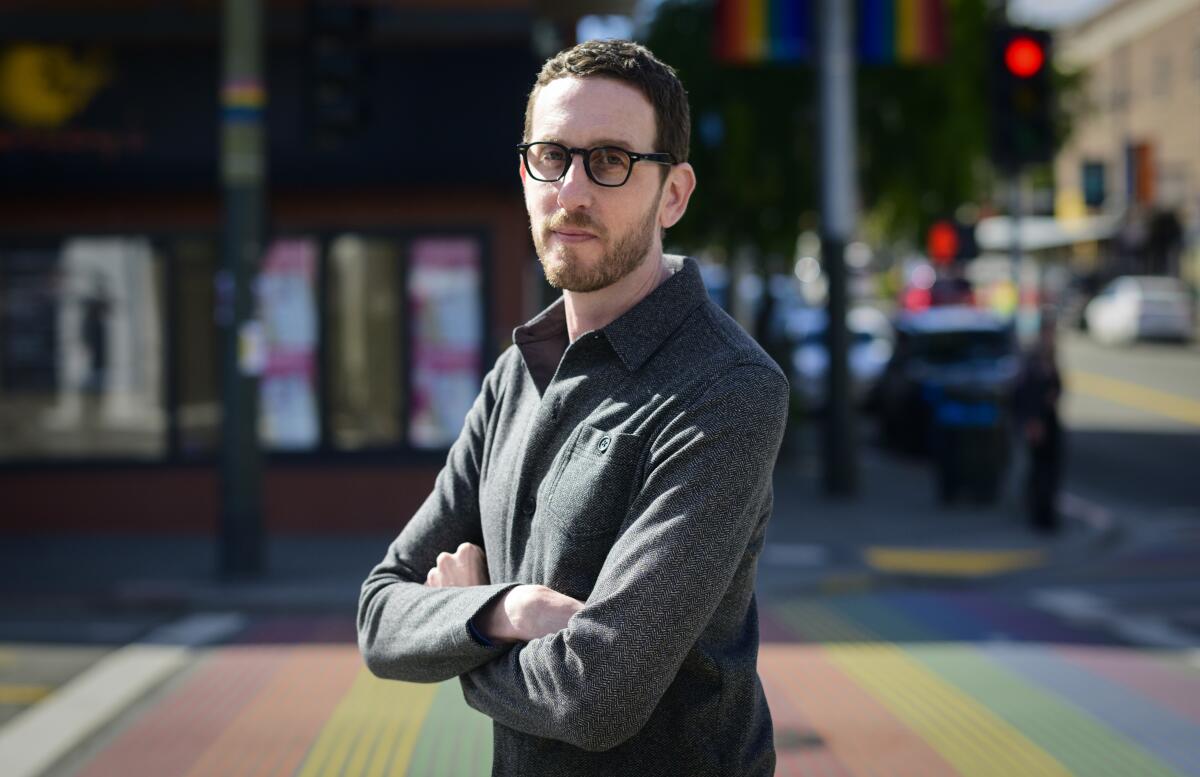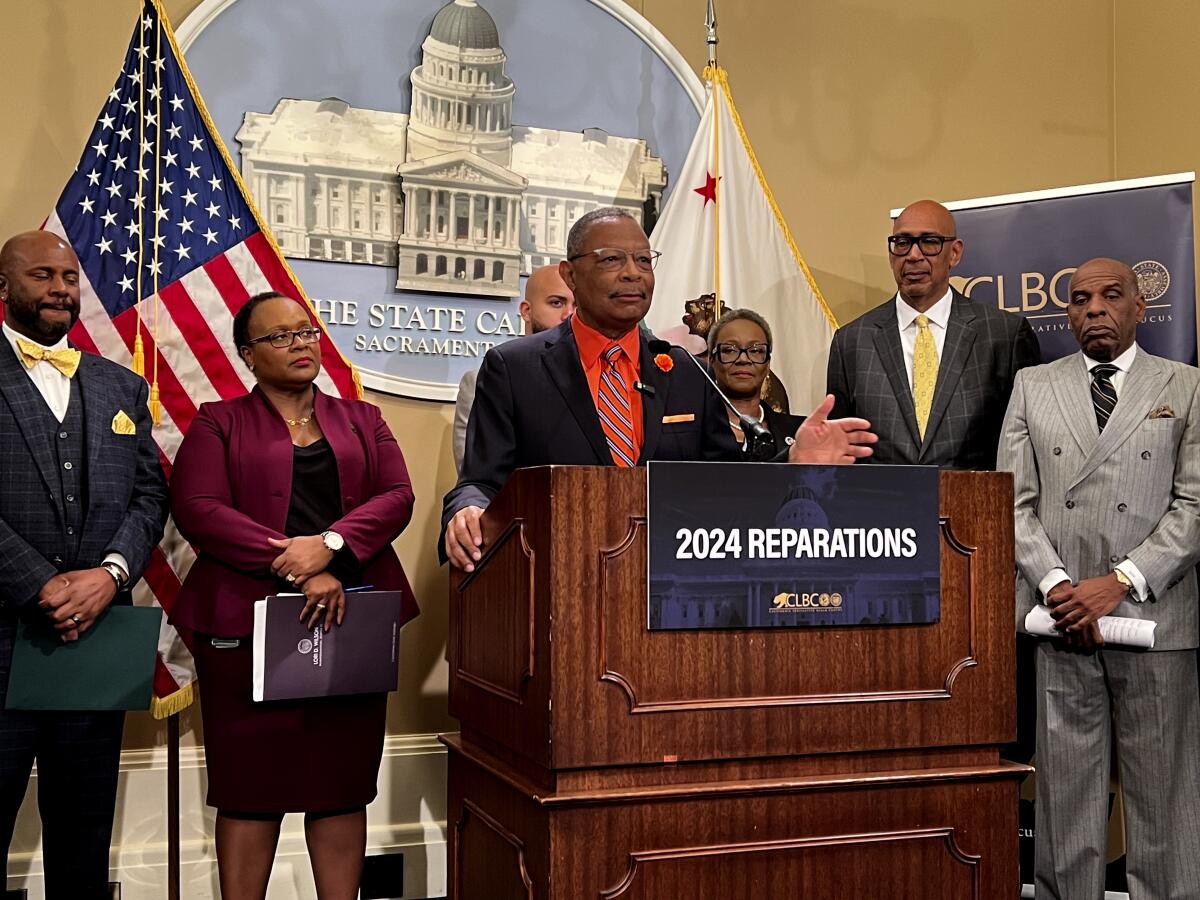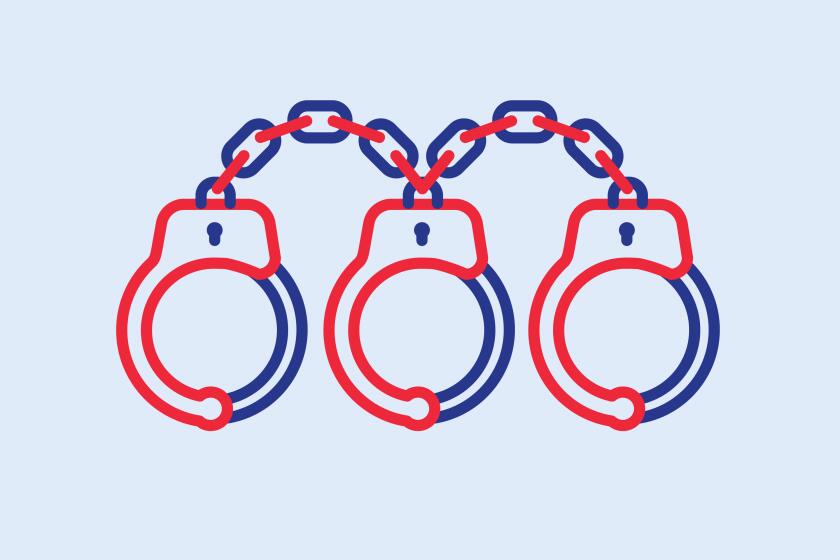California lawmakers got tougher on crime this year. What will Newsom decide?

- Share via
SACRAMENTO — In response to growing worries about crime in California, the Democratic-controlled Legislature has passed a set of stringent bills that mark a significant change in its approach to criminal justice reform compared with previous years.
Democrats who have recently made a consistent push to reduce prison populations by prioritizing rehabilitation and drug and mental health treatment had to find middle ground with new leadership this year who made alleviating public anxieties about crime a top concern.
As a result, lawmakers voted in favor of stiffer penalties for sex offenders, repeat shoplifters and car burglars, and rejected bills to limit solitary confinement in prisons and expand eligibility for parole. The change marks a complex and controversial moment in the state’s debate over balancing public safety with progressive criminal justice goals.
“If we look at the history of California, the pendulum always corrects itself and shifts one way or the other,” Jonathan Raven, the assistant chief executive officer at the California District Attorneys Assn., told The Times. “I think now you’re seeing the pendulum swinging back.”
The association remains a powerful voice on public safety issues in California, and this year it championed a highly contested November ballot measure that, if passed by voters, will send more people to jail for drug possession and property crimes.
What’s different this year, Raven said, is that lawmakers are taking action on constituent concerns about rising crime. This comes in an election year when political careers are on the line.
This measure asks voters to change parts of Proposition 47, a controversial ballot initiative passed in 2014 that turned some nonviolent felonies into misdemeanors.
At a news conference Wednesday morning, Gov. Gavin Newsom disputed the idea that Democrats were suddenly moving tougher on crime, saying their approach has always been “iterative.”
“We’ve been focused on this for years and years,” he said.
The governor has already signed 12 bills that crack down on theft, and now must decide whether to sign or veto a number of other criminal justice bills lawmakers sent him before the legislative session ended Saturday.
After years of failed attempts, Sen. Shannon Grove (R-Bakersfield) passed a child sex trafficking bill that could increase criminal penalties for those who buy and solicit children 15 years and younger. The bill passed overwhelmingly in a bipartisan vote and is headed to the governor for his consideration.
Last year, lawmakers almost gutted a similar bill that cracked down on the trafficking of minors for sex; but in a last-minute nudge from Newsom, Democrats reversed course.
Sen. Scott Wiener (D-San Francisco) said Democrats have always been willing to come to the table on creating stiffer penalties for sex trafficking but the bill required major changes before Democrats could get on board.
During debate on the Assembly floor last week, Assemblymember Joe Patterson (R-Rocklin) accused Democrats of still being too lenient on one of the most heinous of crimes.
Other bills lawmakers passed to crack down on crime include one that could extend the statute of limitations for domestic violence incidences to seven years. Another would make it a misdemeanor or a felony for people who harass, intimidate or commit an act of violence against someone seeking abortion care or working at abortion clinics.


Assemblymember Reggie Jones-Sawyer (D-Los Angeles), a retiring member of the Legislative Black Caucus, chaired the Assembly Public Safety Committee from 2016 until 2022 when he was removed from his role after a shake-up over Grove’s first sex trafficking bill. He was replaced by Assemblymember Kevin McCarty (D-Sacramento), a candidate for mayor of Sacramento, who has taken a more hardened approach to public safety.
He told The Times that crime has always gone up and down over time, which is why he always tried to say “right in the middle.”
Jones-Sawyer opposed several bills in a package of retail theft bills that would create stiffer penalties for low-level theft offenses. He thinks his Democratic colleagues fell for the perception of fear that he said has been perpetuated by law enforcement and “MAGA” supporters.
“I think they’re scared,” Jones-Sawyer said about his colleagues, who he suggested might be scared to lose their legislative seats if they’re perceived as soft on crime. “When I was here, there were people that were strong enough, brave enough to stand up to those kinds of threats.”
While criminal justice advocates are split on their support for the legislative package, some have called it less punitive than Proposition 36, a ballot measure that could send far more people to prison for low-level crimes, they are still cautious of the intent of passing these bills when property crime rates are trending down in parts of the state.
Senate President Pro Tem Mike McGuire told reporters at a panel in July that though there were some “reservations” to bringing forward the retail theft package, he felt it ultimately met the needs of Californians.
Advocates from the Vera Institute of Justice and Ella Baker Center, both nonprofits seeking to end mass incarceration, are particularly worried about one bill awaiting the governor’s signature, Assembly Bill 1960. Authored by Assembly Speaker Robert Rivas (D-Hollister), it would add years-long sentencing enhancements for property damage or theft during any felony. They say it is identical to part of the ballot measure that Rivas has publicly spoken out against.
Another successful bill from Sen. Marie Alvarado-Gil (R-Jackson), who was elected to the state Legislature in 2022 as a Democrat but switched parties this summer, makes rape of an unconscious person a felony.
If signed by Newsom, it would be added to the list of violent felonies that qualify as three strikes, which imposes longer prison sentences for repeat violent offenders — something that Democrats have resisted. California’s three-strikes law mandates that individuals convicted of three or more serious or violent felonies receive a mandatory life sentence with the possibility of parole after 25 years. Before this year, according to the bill analysis, lawmakers have attempted — and failed — nearly nine times to make the rape of an unconscious person a felony.
“[This] has not been an easy task,” Alvarado-Gil said. “It’s been a lot of heavy lifting.”
During the 1980s and 1990s, when cocaine use and murders surged, California imposed harsher penalties and aggressive law enforcement tactics aimed at curbing drug-related crimes. This led to a dramatic increase in incarceration rates, in part due to the three-strikes law, which affected minority communities and contributed to the state’s overburdened prison system.
“We have a responsibility to make good, smart public policy that we’re not going to regret down the road,” Wiener told The Times, referencing decisions that legislators made during the 1980s and 1990s war on drugs that “exploded” the state’s prison populations to unconstitutional levels. “That’s why we’re trying to be responsive to a very real issue in terms of retail theft, fentanyl, auto break-ins.”
The San Francisco Democrat, whose city has been hit hard with brazen car-break-ins, has tried since 2018 to get harsher penalties on car break-ins and finally had success this year.
For victims’ rights advocates, the actions taken in the California Legislature this year demonstrate that lawmakers are listening to constituents and prioritizing victims and their families, rather than protecting the perpetrators of violent crimes.
“I do see this Legislature finally coming around and pursuing laws that majority of Californians see as serious crimes that should’ve been felonies all along,” said Topo Padilla, board member of Crime Victims United. “I do consider that a victory but it is unbelievable we had to come to this.”
But it can be considered a step back for some criminal justice advocates who have spent years pushing for legislation that reduces the prison population and alleviates the harms done particularly to Black and brown communities that they say have been overly policed for generations.
Gavin Newsom could save the state $1 billion annually by closing five more prisons, analysts say. The governor finds himself in a precarious political spot.
Michael Romano, director of the Three Strikes Project at Stanford University, said he still thinks California is headed in a “positive direction,” despite some losses this year.
“I think this year has felt a need to be tougher on crime,” he said. “But I do think this is part of the ordinary noise in the legislative process.”
There were some wins for criminal justice advocates who are seeing a few prison reform bills head to the governor, including one that would allow for more transparent media access in prison settings and another that would limit the number of empty beds in facilities to avoid wasteful prison spending.
Other bills that faltered included one that would have created protections for prisoners who endure sexual assault while serving out their term, and another adding protections for prisoners held in solitary confinement.
Senate Bill 94 by Sen. Dave Cortese (D-San José) — the lawmaker’s second go-around — would have given an option for those who are sentenced under the state’s special circumstances law to life in prison without the possibility of parole to be granted an option for a parole hearing after serving a certain number of years. It passed the Senate but was not taken up for a vote in the Assembly.
“I don’t know what’s happening to be honest. All we know is we’re getting stonewalled,” Cortese said during the final week of the session, adding he hoped that it being an election year didn’t influence his bill’s failure. “I hope that all members of the Legislature would put criminal justice ahead of any other consideration.”
More to Read
Sign up for Essential California
The most important California stories and recommendations in your inbox every morning.
You may occasionally receive promotional content from the Los Angeles Times.













